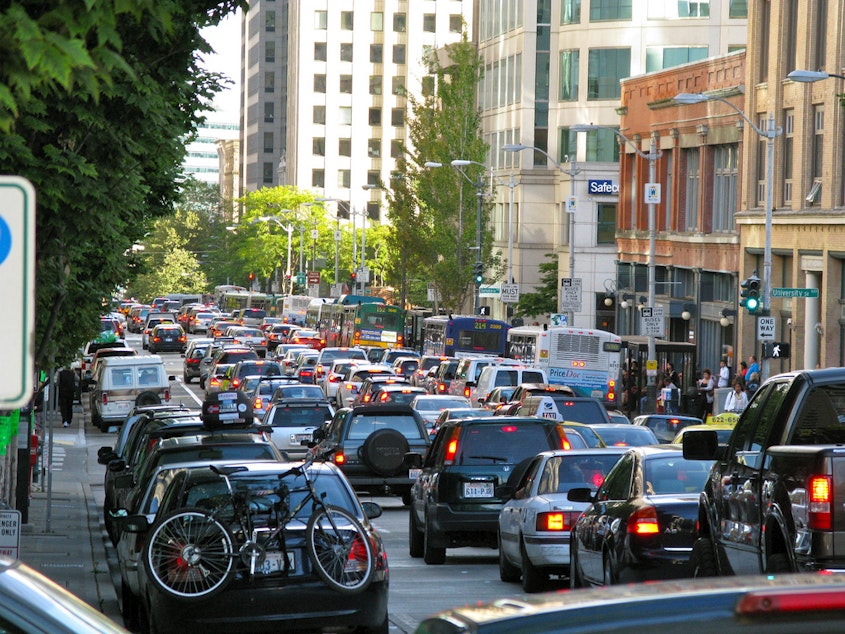Should Washingtonians Pay For Every Mile They Drive?

You drive from Seattle, over the Cascades, through Yakima, then down into eastern Oregon. And the government knows where you are all along the way.
Privacy is just one concern with a proposal for a pay-by-mile system to fund roadwork, said Mark Hallenbeck, director of the Washington State Transportation Center at the University of Washington.
Such a system would be a fundamental change in the way Washington state pays for its roads.
Right now, state and federal taxes on each gallon of gas are used to make highways safer, fix potholes and tackle congestion. But as vehicles become more fuel efficient, less revenue comes in.
The Washington State Transportation Commission is considering whether a pay-by-the-mile system could replace gas taxes. (See details on the commission’s website.)
Sponsored
There are a lot of obstacles, Hallenbeck told KUOW’s Bill Radke.
“If you’re the federal government, it’s easy,” Hallenbeck said. “Every year when you register your car, I read your odometer and I subtract this year’s from last year’s and you pay me 2 cents a mile.”
But there’s a problem at the state level.
“Washington state can’t tax you for how many miles you drove in Oregon. So if I just read your odometer, I don’t know,” Hallenbeck said.
“At the state level I have to do something like put a GPS device in your car, because I have to know when you leave Washington to go elsewhere. That raises huge privacy concerns, and it also makes it tougher to figure out from a cost perspective. Because now I have to have a GPS, I have to put technology in to capture it, I have to guard your privacy.”
Sponsored
Consumers might instead get a choice of options:
- Add the GPS in your car.
- Use your cell phone and some sort of app.
- Go the odometer route. The consumer might pay at a lower rate that assumes some miles will be driven outside Washington state.
- Pay a flat fee for unlimited mileage. Hallenbeck said drivers of all-electric vehicles already do that.
In addition to privacy concerns, there are issues of fairness.
“If you’re driving a long distance and wearing out those roads, then you’re the one who should be paying for that. From an equity perspective, this is fair,” he said.
But is one mile in congested, expensive Seattle the same as one in less wealthy, wide-open Grant County?
Sponsored
“If you go to something like a GPS system, you could set differential rates,” Hallenbeck said.
That might mean setting them higher in Seattle because of the expense of projects there. Or it might mean setting them lower in Seattle to compensate people there for higher levels of congestion they face.
“That’s an interesting political argument to go on top of the technology,” he said.
So GPS opens up the possibility of being fairer to people facing different driving conditions. But it also raises privacy and technological concerns.
“And that’s why they want to do a pilot test,” Hallenbeck said. “Does this work? Are we happy?”

